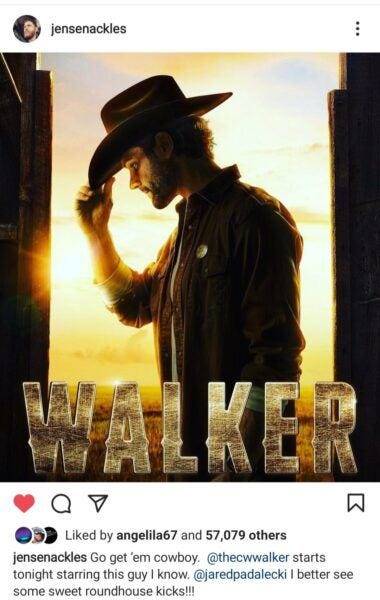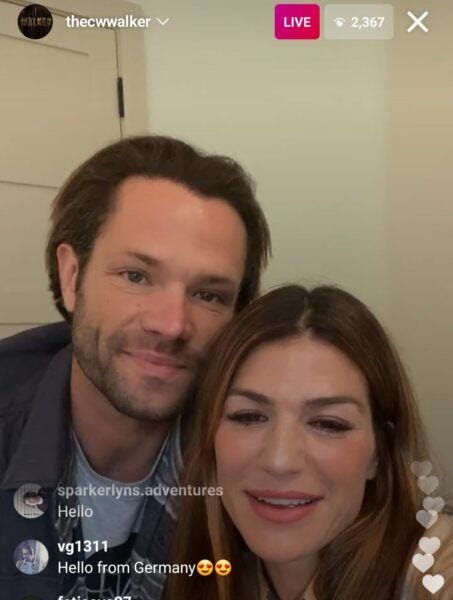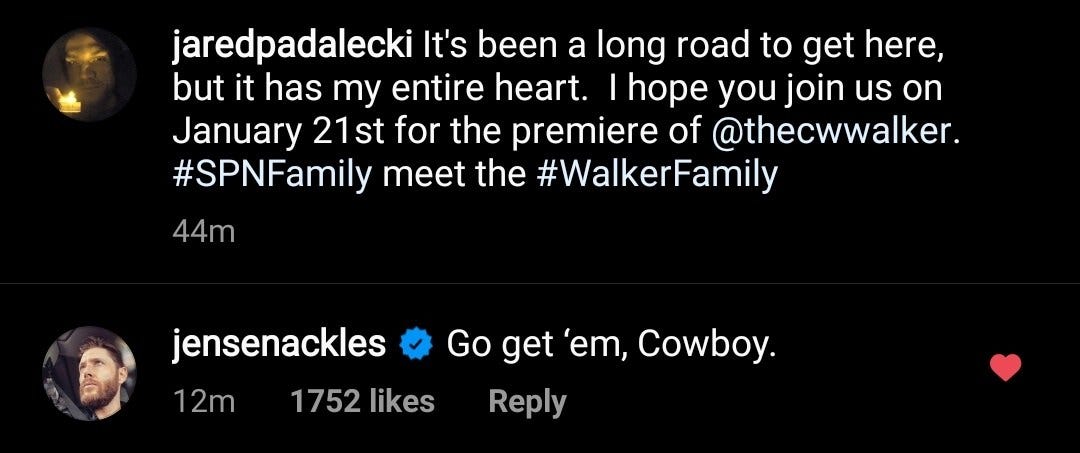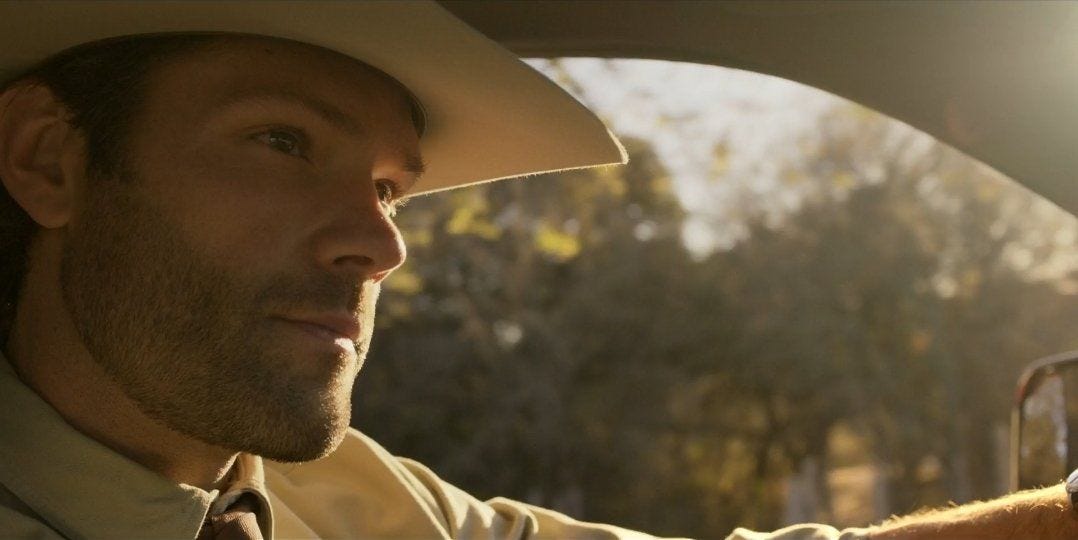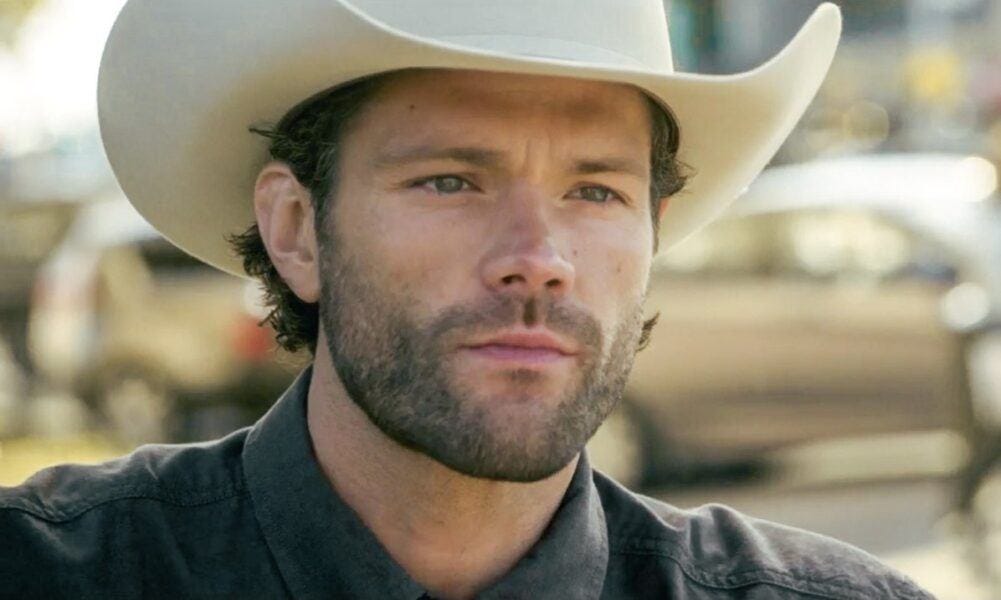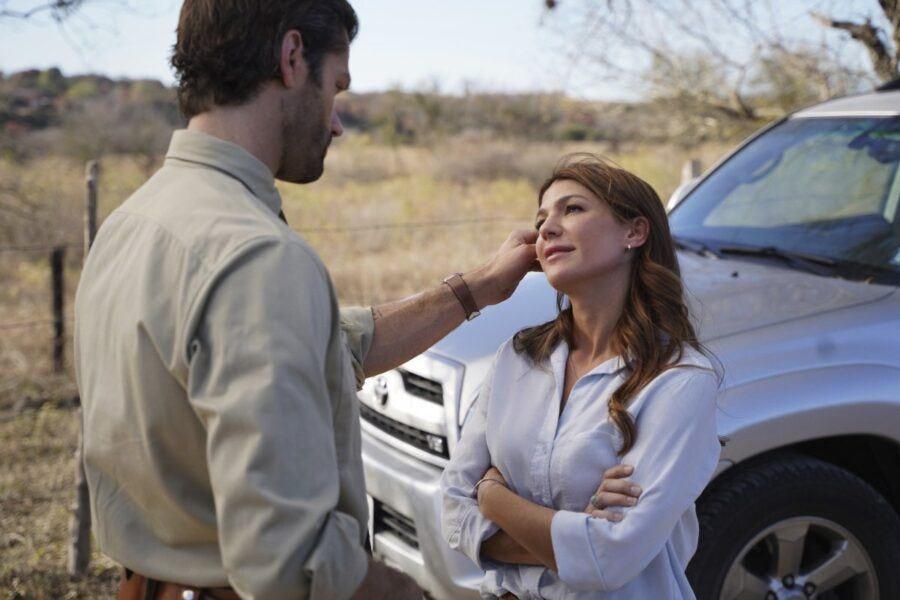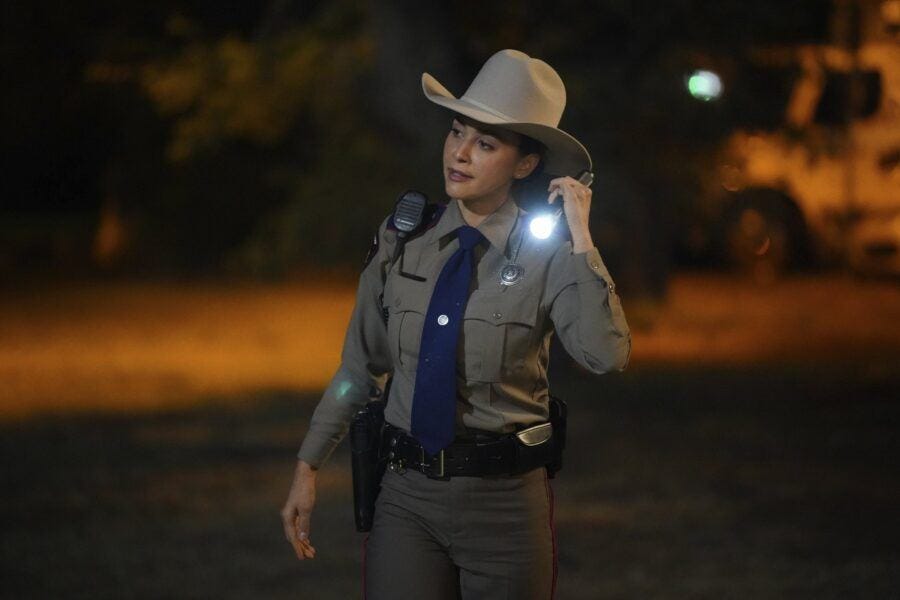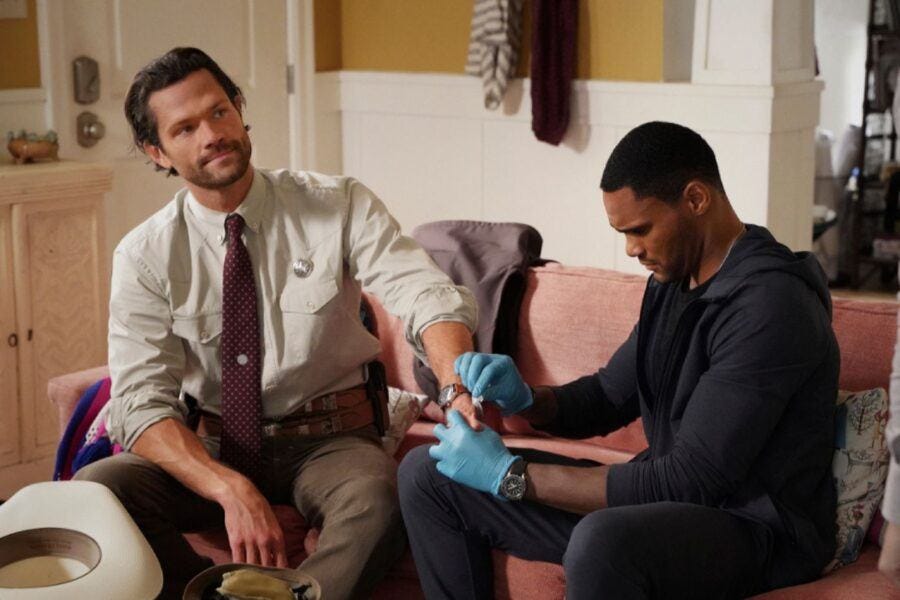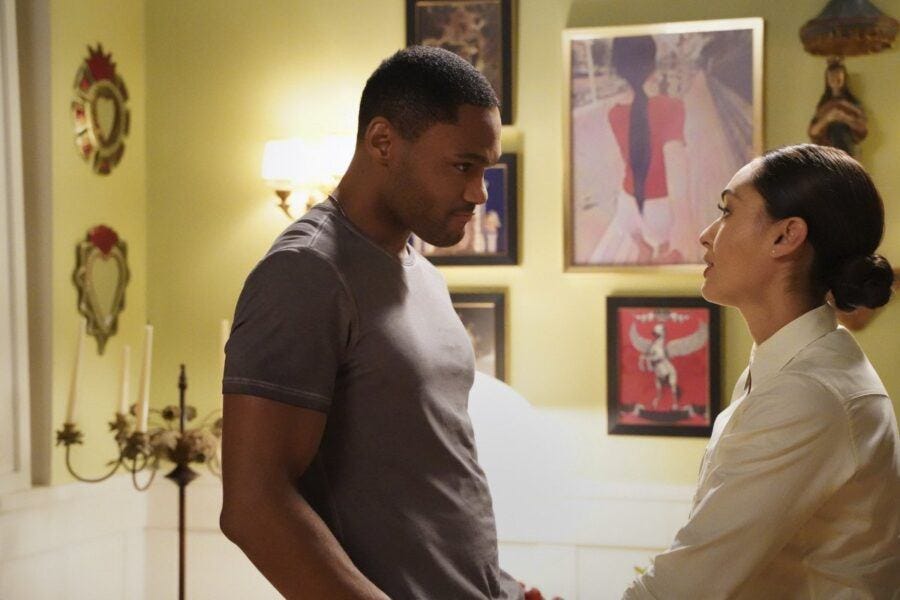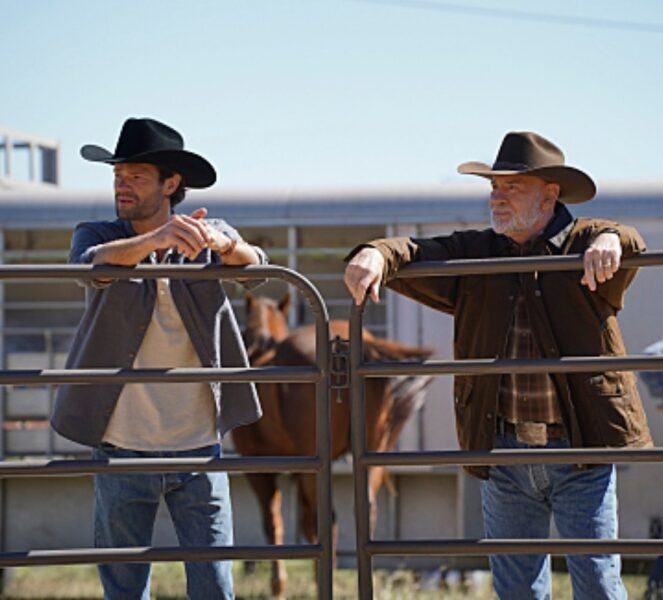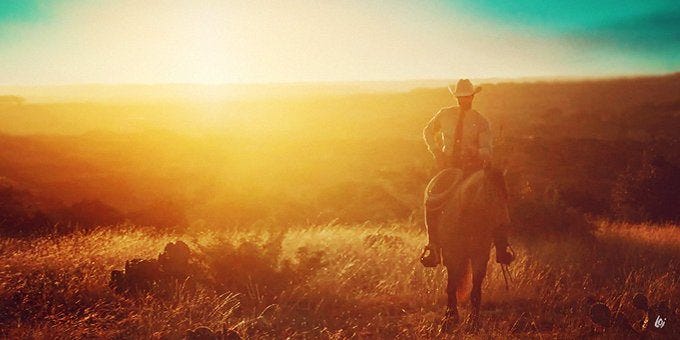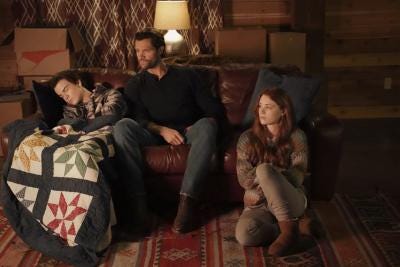Jared Padalecki brings shades of ‘Supernatural’ with his new ‘Walker’
Click to read the full story: Jared Padalecki brings shades of ‘Supernatural’ with his new ‘Walker’
For “Supernatural” fans, who are still grieving the loss of our beloved show after 15 years on the air, the premiere of the new CW show “Walker” on Thursday brought a lot of complicated feelings. Many of us weren’t ready (and to be honest, would never have been ready) to say goodbye to Sam Winchester, so seeing Jared Padalecki inhabit a brand new character was exciting but also brought a fresh sense of loss, as though the new character made the loss of Sam finally real.
On the other hand, it was wonderful to have another television show to anticipate, and for Thursday nights at 8 pm EST to be something special once again. In the midst of continuing controversy about the way “Supernatural” ended, and a hashtag campaign to tank “Walker” before it even began, the show itself managed to air with considerable fanfare anyway – making it the CW’s most watched Thursday in three years, even topping NBC’s airing in its time slot!
The network went all out in its promotion, with billboards and articles in every mainstream publication and Jared making the talk show rounds. The “Supernatural” cast also went all out, with most of Padalecki’s former cast members sending him best wishes for his new show.
On premiere day, former onscreen and always offscreen brother Jensen Ackles posted an Instagram message of support, telling Padalecki to “Go get ‘em, cowboy” and Jared and wife/costar Gen gave a shout out to Jensen and Danneel Ackles’ Austin-based brewery, Family Business Beer Company, on their CWWalker Instagram takeover. For “Supernatural” fans making the transition to new shows, the reminder that in real life they’re all good friends was somehow comforting. Padalecki has also said that he’s set on getting former costar Ackles to guest or direct on Walker as soon as his filming schedule for Amazon’s ‘The Boys’ allows.
I did not watch the original “Walker Texas Ranger,” nor am I a big fan of either westerns or cop procedurals, so “Walker” wasn’t a show that would have been on my must watch list if it wasn’t for Padalecki. That meant I went into it with measured expectations, and still feeling a bit sad about missing the Winchesters.
There were mixed reviews from the media who received advance screeners of the pilot (Rotten Tomatoes has the show at a lowly 27 percent), but I like to make up my own mind anyway, so I sat down to watch figuring I’d just see where the show took me. I didn’t expect to feel as much as I did, and for me, that’s a very good thing. I didn’t even fall in love with “Supernatural,” my favorite show of all time, right away; I had to get to know the characters.
They had to pull me in, make me want to know more about them. Fascinate me. And while I’m not pulled in entirely yet with “Walker,” I am interested. I want to know more. And that bodes well for a brand new show.
I have to admit, the second that I saw Padalecki back on my tv screen again, I teared up.
For those who are familiar with my (not exactly brief) reviews and recaps for “Supernatural” and “The Boys,” for “Walker,” I’ll provide mostly analysis along with a brief recap for each episode. “Walker” is a different kind of show, so I don’t think an extensive recap is needed – but it’s also surprisingly rich in characters and themes to dig into. For those not familiar, as always, I write as both a fan and a clinical psychologist, so there will inevitably be some deeper takes and some just-for-fun ones. Sorry (not sorry).
So, very brief synopsis:
Cordell Walker lost his wife, Emily (Gen Padalecki, Jared’s real life wife), eleven months before the series begins, when she was murdered under mysterious circumstances. Like many people confronted with trauma and loss, Cordell (who prefers to be called Walker) threw himself into work to avoid being overwhelmed by emotion, going undercover for nearly a year and leaving his grieving son and daughter behind to be cared for by his parents and younger brother. Also as is common with loss, Walker vacillates between avoidance with work or alcohol and obsessing about Emily’s death, carrying around a poker chip found on her body and imagining her still with him. His relationship with his children suffers, both of them feeling abandoned and expressing that in different ways.
Meanwhile, his new partner Micki Ramirez (Lindsey Morgan) first meets him when she picks him up for public drunkenness, and their relationship doesn’t get a lot smoother from there. She’s got her own challenges to deal with, a Mexican American woman making her way up to the Texas Rangers despite her own family’s disapproval and ready to make damn sure Walker doesn’t ruin things for her.
Micki also has a relationship to negotiate, with her recently returned boyfriend Trey. The pilot sees Micki and Walker working together on a case for the first time and in their clashes some of the themes that the show will explore are interwoven, including an examination of masculinity, racism and social injustice. Walker loses his temper and gets into a brawl with a suspect; Micki and Walker’s new boss chastise him instead of going along with the “he swung at me first” rationalization that we see too often upheld.
Walker basically screws up repeatedly during the first episode, but the ending is hopeful, as he turns down a job opportunity that would have taken him away from his kids again and instead settles the three of them into a small house on his parent’s ranch property.
This version of “Walker” has an interesting real life origin story. The idea took form in part thanks to Padalecki reading a story about a law enforcement agent who couldn’t bring themselves to put a three-year-old child in a cage and separate them from their parents. He was fascinated by the liminal space in which that person was stuck, between empathy/morality and orders/duty.
The show doesn’t shy away from the ways in which enforcing the law without empathy can lead to dehumanizing other humans, with tragic consequences. It also doesn’t shy away from interrogating what masculinity means, especially in America as epitomized by Texas, and how entitlement and normalizing aggression have contributed to a culture in which masculinity is sometimes toxic.
Padalecki’s character is a flawed hero, a trope I enjoy, in that the cultural conflicts the show takes on are played out in his personal circumstances. That’s a contrast to the original “Walker,” whose Chuck Norris was an unexamined hero who apparently kicked a lot of people…and wore shorts.
Padalecki’s Walker, on the other hand, is not an unexamined hero, and he’s far from perfect. In fact, in the pilot he’s sort of having a terrible horrible no good very bad day – but some of that is on his own shoulders.
While I expected Padalecki to be as lovable as he is in real life (he wrote a chapter for my recent books and is absolutely wonderful) and as lovable as Sam Winchester was to me, it turns out that it’s more complicated than that. Cordell is both irritating and someone who draws my empathy.
He’s a man navigating an evolution he didn’t ask for, and he’s not exactly navigating it smoothly. You get the sense that his marriage and family were ‘traditional’ in the sense that Emily did more of the hands-on childcare while Walker concentrated on his role as a Texas Ranger.
In the flashback we see in the pilot, his awkwardness at family game night, and her affectionate eye rolling encouragement, speak to a family that kept those traditional lines, and Walker’s comfort with those. As so often happens in real life, a trauma (in this case Emily’s mysterious murder) turns Walker’s comfortable life upside down. As is also realistic, he has a hard time dealing with that – and so he doesn’t.
Instead of stepping up to be there for his grieving kids, Walker throws himself into the role he knows and takes a long-term undercover assignment for work.
I’ve written a lot about how Supernatural’s finale (and the entire show) was like a master class in grief and loss, and interestingly, “Walker” picks up that theme as well. The characters and the relationships between them have been shaped by trauma and loss, and many of them – like so many of us – are having a tough time dealing with it.
The flashback scene in which a frantic call from Emily interrupts Walker’s awkward attempts at game night is difficult to watch; most of it rang true, as Walker at first doesn’t panic; even attempting calm and going outside so as to not alarm the kids. When he can’t reach her again, he does panic, and we see her phone ringing as she lies dying on the grass. I was caught off guard by Walker collapsing on the ground after a scream of anguish, not because that’s not a realistic reaction, but because it came so quickly.
He can’t see her lying on the ground dying like we can, after all, so I’m not sure why he ‘knew’ she was dead just because she didn’t answer her phone right away. Whether that’s editing or writing, I don’t know, but Walker’s reaction threw me out of the moment because of that, which is too bad because Padalecki sounded truly anguished.
When the story picks up in the present, Walker has spent the past eleven months avoiding his feelings (and his children’s), by trying to lose himself both in his work and in alcohol. As the current story begins, he can’t face returning to his family because that will mean he can no longer avoid the reality of his wife and their mother no longer being there. He gets drunk instead, while his heartbroken children and the rest of the family wait for him to show up at his own welcome home party. Ouch.
Like many people who experience an unanticipated loss, Walker seems to have blamed himself for Emily’s death. Unfortunately for humans, that sort of self-blame is common after any trauma.
Part of the trauma is feeling out of control and helpless, and the terror of feeling like we can’t protect ourselves or our loved ones is difficult to bear. Sometimes the way we deal with that fear is to shift our understanding of what happened in order to feel like we did and do have some control – if we could have done something to prevent the trauma from happening, then maybe we won’t be helpless to stop it the next time.
Unfortunately, that means self-blame and guilt often go hand in hand with trauma and loss. The fact that Cordell is obsessed with how Emily died, carrying around and constantly toying with the poker chip that Emily had with her when she died, suggests that he feels responsible no matter how illogical that might be. Which explains the bout of self-loathing and getting drunk at the gazebo that was a romantic spot he shared with his wife.
Not a very heroic introduction – which made the show so much more interesting. Walker also struggles with those stereotypical norms of toxic masculinity. When a suspect goads him later in the episode, blaming him for his wife’s death and throwing a punch, Walker loses his temper and erupts, smashing the man onto a table. Ramirez pulls him off and gives him little sympathy for his busted hand; later, Walker’s boss Captain James (Coby Bell) is similarly unimpressed, warning him to get himself under control. He refuses to let him off the hook with the empty apology that so often follows an action that has tacit support from cultural norms.
Captain James: Apologies won’t cut it. Do better.
Neither his partner nor his boss let his rationalization of “he swung first” convince them otherwise, which was a refreshing change from what we often hear – and frankly, from what we sometimes believe in the real world too. Ramirez doesn’t mince words, calling him an idiot and saying she was “not prepared for jackass disasters”. I admit I laughed out loud at Morgan’s delivery and Padalecki’s response, managing to look both affronted and sheepish.
Walker’s children aren’t dealing very well either. “Supernatural” was also a show about what happens to children who lose their mother, and how that can be complicated by a father too caught up in his own grief to be a parent. Walker’s daughter Stella (Violet Brinson) responds to her hurt by wanting to write her father off, protecting herself from ever getting her hopes up again only to have him disappoint her – or to ever again lose a parent who she depended on and loved. She’s overtly angry as teenagers often are and doing a great job of rebelling to get back at her father for his abandonment (and probably her mother too, though that abandonment probably won’t be acknowledged as such). That she chooses some substance use to do it rang so true. He drinks too much, why shouldn’t she get picked up for drug possession?
Stella: Using a substance to numb the mind, who does that?
Touche, Stella. Bonus points for making her law enforcement dad have to come get her in front of other officers. Padalecki plays Walker’s anger just right, letting us see him in all his unflattering hypocrisy but also showing that edge of caring underneath that lets us identify with him a little too. Those of us who are parents, at least!
Walker’s son (Kale Culley), at first introduction, seems to be faring better. Unlike his sister, he refuses to give up on hoping their dad will show, which must have made their eventual cancelling the welcome back party even more painful. Defenses can get in your way, but they also can minimize your hurt in the moment.
Walker’s mom, who’s clearly painted as the wisest one in the extended family, doesn’t let Walker just assume that August is okay like he wants to, though. She points out that he’s TOO okay – faced with too much loss and abandonment, August is the kid who hopes that if he’s perfect, he won’t have to lose anyone else.
The show did an excellent job with showing the different ways children react to disrupted attachment, some lashing out and claiming independence, hoping that if they act like they don’t need anyone, maybe they really won’t. Others try to do everything right, hoping that will convince the people they love to stick around. Neither method works well or facilitates healthy relationships in the long run.
So far, I’m most intrigued by the family conflict and relationships in the show, and the exploration of how we as humans respond to trauma and loss. But I also was unexpectedly taken with Lindsey Morgan’s character, Walker’s partner Micki Ramirez.
The show doesn’t shy away from examining other sociocultural issues in addition to asking questions about masculinity, including racism and sexism. Micki is Mexican-American, and her history is shaped by both racism and expectations for her as a woman that conflict with her choice of career. Her rise through the ranks to Texas Ranger has been complicated by both constraints, which have given her a take-no-shit attitude that is a joy to watch and a rift with her family that clearly causes her pain (that she doesn’t want to talk about).
I hope the show will include some exploration of what the norms of femininity are as well as masculinity – the pilot was written, directed and produced by women and the showrunner is also a woman, so the show is in a unique position to undertake that exploration and do it justice. (Jessica Yu directed and series creator Anna Fricke wrote the pilot episode).
We’ve already heard Micki note in passing that ‘my mother wouldn’t let me play with dolls so I learned about cars’, so she clearly has an interesting backstory herself when it comes to gendered norms and expectations.
The dynamic between Walker and Micki works, as does the dynamic between Padalecki and Morgan (who were apparently told they had too much chemistry in the chemistry read!). When Walker is being an ass, she calls him on it. Thanks to both the writing and the delivery of her lines, those are some of the best moments of the pilot, and the fact that as a viewer you often find yourself on Micki’s side instead of Walker’s is an unexpected but welcome twist.
There are small moments between them that say so much, like when Micki tells her boyfriend Trey (Jeff Pierre) that Walker “thinks he knows everything about me already.” It’s a subtle way of calling out the knee-jerk assumptions that come from stereotypes that we often don’t even know have kicked into place. Kudos to Fricke for that nuanced bit of writing. Trey is as charismatic as the other main characters, and Micki and Trey together have graced the grateful fandom with a multi-racial ship with the fabulous name of “Tricki”.
We haven’t seen too much yet of Walker’s relationship with his little brother, Liam (Keegan Allen). I feel like as a “Supernatural” fan, I’m primed to see Jared play a brother, but it’s odd that this time he’s the big brother instead of the little brother. There were no overt “Supernatural” shout outs or Easter eggs, but there were several subtle ones, including the wrestling match that Walker gets into with Liam when they’re reunited. (And the fact that Cordell keeps saying ‘call me Walker’ much like Sam Winchester corrected everyone with ‘it’s Sam.’)
Liam has stepped in to play a father role for Stella and August in Walker’s absence, and that will inevitably cause friction sooner or later. He is also the one who confronts Walker about hanging onto Emily through an obsession with her death, embodied by his carrying around a poker chip that she had on her for some reason when she died (the beginnings of the show’s mystery story line). Liam and Walker are obviously close, so much so that the younger brother calls him “Cordi” at one point, so I’m intrigued to know more.
The show also has a gay character in Liam (and his husband Brett, who we haven’t met yet), which was included in a refreshingly matter of fact way. I’m looking forward to learning more about the relationship between the brothers as we go along.
Walker’s parents Bonham and Abilene (Mitch Pileggi, who played Sam Winchesters’ grandfather on “Supernatural,” and Molly Hagan) are also interesting. So far all we know is Walker’s dad seems even more like the stereotypical Texas dude than Walker, gruff and critical and a little behind the times. His mother is the matriarch, wise and loving but possibly controlling too. (She enrolls the kids in Catholic school without asking him and sets up the house on the property for Walker and the kids before even asking him if he wants to move in there, but this is presented as a good thing even though my psychologist brain doesn’t think so). We’ll see.
The final relationship that’s introduced in the pilot episode (whew, that was a lot of introductions!) is Walker’s friendship with Emily’s friend Geri (Odette Annable), who makes him a drink at the bar and then does a few seconds of two-step with him before Walker is predictably called back to work. While his partnership with Micki seems set up to be a platonic bond, Walker’s friendship with Geri has a more romantic undertone just by virtue of the few moments of dancing. I’m not sure either felt very comfortable with it – or perhaps with two-stepping on camera – and I don’t think I’m up to shipping anyone or anything after my fifteen years with “Supernatural” fandom, but we’ll see where this relationship goes too.
Both Padalecki and Morgan have talked about how they want to explore and ask questions in the show, not shove answers down the audience’s throat; that they want to tell a story of two perspectives that might sometimes clash. That’s a tall order, and a middle of the road approach that sometimes backfires and doesn’t do justice to either, but it’s also something that could be helpful in a real world that’s divided and struggling with finding any common ground whatsoever.
There are references to the immigration issues that inspired the show in the first place, as Stella’s friend comes from a family who are undocumented and living in fear as a result. In fact, the explicit question, “who does the law protect?” is raised in this first episode. Padalecki has said that one of the things they are trying to do in the show is to “give voice to the voiceless in the best way that we can.” Again, a tall order, but a worthy goal.
As always for me, the relationships and the characters themselves are what interest me most. I miss Sam Winchester like hell, but I didn’t want to see him in Cordell Walker. And I didn’t. Jared had to start filming “Walker” very quickly after wrapping fifteen years of “Supernatural” thanks to Covid delays, which must have been quite an undertaking. He’s clearly put a great deal of thought into bringing a brand new character to life, and so far it seem to be working.
As much as I’m all about the characters, “Supernatural’s” incredible cinematography and set decoration enriched the series for me, so it was nice to see some beautiful shots of Austin, where the show is filmed, in the pilot. Austin is another one of my favorite cities in the world (Vancouver, where “Supernatural” was shot, is another) and the beauty of its food-truck and music-loving city that proclaims “keep Austin weird” came through, as did the stark beauty of the out-in-the-country locations around Dripping Springs.
One of my quibbles with the show is an odd one – the first quarter of the show was strangely difficult to hear. In part that was because Padalecki and Morgan talk really fast, unlike the stereotypical Texan drawl, and in part that was because the music in the background ended up being more in the foreground at times.
I get that the show wants to foreground Austin, and I’m all for that because it’s a city I love, but the music can’t drown out the dialogue. Hopefully, that will be fixed in episode two.
Pilot episodes often are overwhelming as they introduce too many characters that we don’t know or care about yet. They also try to provide enough exposition to fill in back story, and to some extent “Walker” did both those things. However, the characters are interesting enough and the performances strong enough that I began to care a little about them already – which means I’m really looking forward to next week.
Not gonna lie, I’ll still be missing “Supernatural” on Thursday evenings, but I’m grateful to have another show to look forward to in that time slot.
Walker’s final words in the episode are hopeful – a reminder that we need to live in the moment as much as we can, instead of avoiding our more painful feelings by running away from them.
Walker: Now’s all we’ve got.
Looking forward to learning more next Thursday with “Walker” 102 Back in the Saddle!
The post Jared Padalecki brings shades of ‘Supernatural’ with his new ‘Walker’ appeared first on Movie TV Tech Geeks News By: Lynn Zubernis

